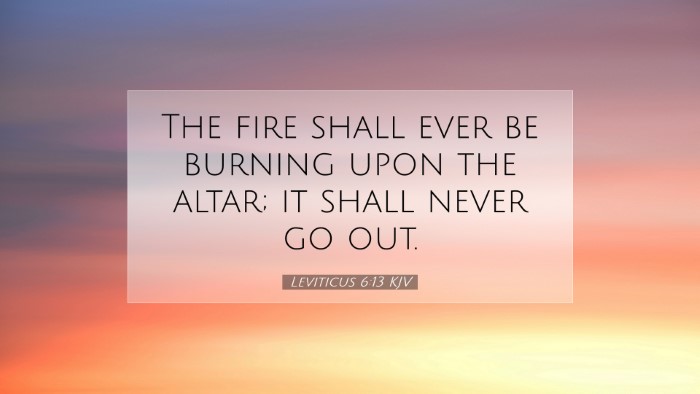Commentary on Leviticus 6:13
Text of Leviticus 6:13:
"The fire shall ever be burning upon the altar; it shall never go out."
Introduction
Leviticus 6:13 encapsulates a profound aspect of Israel's worship and the perpetual covenant between God and His people. The command concerning the continual fire on the altar is rich with theological implications, serving as a lasting symbol of God's presence, holiness, and the dedication required from His followers.
Contextual Background
Leviticus, often referred to as the legal and ceremonial guide for the Israelites, details the laws given to Moses on Mount Sinai. The chapter provides instructions on the various offerings and the proper procedures for sacrifices, underscoring the holiness of God and the necessity of atonement for sin.
The Significance of the Ever-Burning Fire
- Symbol of God's Presence: The requirement for the fire on the altar to remain lit signifies God's abiding presence among His people. As Matthew Henry observes, the fire represents the divine favor that dwells within the sanctuary, reminding the Israelites of their continuous need for God’s engagement.
- Holiness and Purity: The consistent burning of the fire points to the need for spiritual purity and holiness. Adam Clarke notes that the fire, fed by the sacrifices offered, indicates the constant need for atonement. This parallels the New Testament understanding of Christ's sacrificial work, where His atonement is eternally effective for believers.
- Commitment to Worship: Albert Barnes emphasizes the importance of unceasing worship and dedication in the life of a believer. The fire's perpetual state encourages the ongoing expression of worship toward God, illustrating that the relationship between God and His people requires ongoing commitment and sincerity.
Theological Implications
The idea of an unquenchable fire invites deeper theological reflection. It represents not only God’s constant holiness but also the believer’s required response of love, obedience, and continual prayer. The verse serves as a reminder of our responsibility to maintain the passion for God in our lives.
Christological Reflection
In light of the New Testament, the perpetual fire foreshadows the ultimate sacrifice of Christ, who ignites the hearts of believers with His redeeming love. As the fire was never to go out, neither is the love of Christ to fade away from His followers’ lives. His sacrificial flame is eternally burning, urging us to share in His passion and mission.
The Role of the Priesthood
Furthermore, the priestly role in maintaining the fire is noteworthy. The Levites, charged with the responsibility of the altar, represent the leadership within the community that must continually inspire and direct toward a God-centered life. It reflects a collective duty to uphold the standards of worship and spiritual discipline.
Practical Applications
For contemporary readers, Leviticus 6:13 challenges us to consider the flames of our own spiritual lives.
- Personal Devotion: Just as the priests diligently tended to the fire, individuals are called to nurture their relationship with God through prayer, Scripture study, and communal worship. This sustained effort fuels the believer’s faith and ensures its vibrancy.
- Community Responsibility: The verse also highlights the communal aspect of worship. Churches and faith communities are to foster an environment where worship is prioritized and the presence of God is sought fervently.
- Enduring Power of Faith: The permanence of fire serves as a metaphor for steadfast faith amidst trials and challenges. The importance of remaining steadfast in devotion and reliance on the Holy Spirit cannot be overstated.
Conclusion
In summary, Leviticus 6:13 is more than a directive for a physical act; it is a call toward spiritual fervor and continuous devotion. The perpetual nature of the fire on the altar beautifully illustrates the eternal commitment of God to His people and encourages believers to cultivate a similar devotedness in their faith journeys. Understanding this verse within its historical, theological, and practical contexts enriches our grasp of worship and God’s unending love through Christ.


